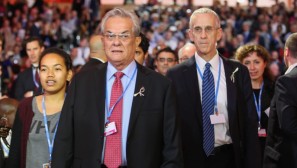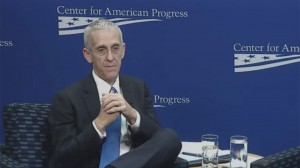Montreal Protocol
China faces pressure over illegal greenhouse gas production
In response to revelations Chinese factories are making CFC-11, a chemical banned under the Montreal Protocol, the UN is considering tougher enforcement
Mysterious emissions of banned greenhouse gas traced to Chinese factories
Illegal production of CFC-11 in China has a climate impact equivalent to 16-20 coal power plants, the Environmental Investigation Agency estimates
Cleaner coolants fund gets $540m – and US backing
The Trump administration is set to ratify the Kigali Amendment to phase down potent warming HFC gases, while helping fund poor countries to make the switch
The Paris Agreement of refrigeration – a bluffer’s guide
Negotiators meet in Kigali next week to agree a global phase-out of HFCs, which could prevent up to 0.5C of global warming
Paris ‘high ambition coalition’ to tackle unfinished business
Climate coalition of rich, poor and emerging economies aims to secure an ambitious deal this year to phase out HFC gases
Crib notes: UN meets in Vienna to debate HFC slashing deal
This week’s top climate politics and policy stories. Sign up to have our Friday briefing and Monday’s crib notes sent to your inbox
US freezing out potent HFCs with fresh curbs
NEWS: Obama administration and businesses announce cuts to super-warming gases ahead of ozone layer treaty meet
African countries drive progress on HFC phase-out
NEWS: Countries could reach deal to curb production of potent warming gases this November after Senegal intervention at Bangkok meeting
Todd Stern on China, India and the UN climate deal
NEWS: US special envoy for climate change spells out what his country hopes to achieve in the UN’s climate change deal
India and China agree to discuss HFC cuts under Montreal Protocol
NEWS: Delhi and Beijing drop opposition to talks on limiting use of climate-warming gases used in refrigeration
HFCs breakthrough possible at Montreal Protocol meeting
NEWS: India stance on highly polluting gas appears to soften as countries meet for ozone treaty discussions
Banned chemical emissions mar ozone treaty’s success story
NEWS: NASA finds a banned ozone-depleting gas is still being emitted, in a blot on the Montreal Protocol’s record
Saudi Arabia blocks action on super-polluting HFCs
NEWS: A deal to phase out potent greenhouse gases used for air conditioning and fridges is within reach but Saudi Arabia is concerned substitutes will not work
Ozone layer treaty could tackle super polluting HFCs
ANALYSIS: The Montreal Protocol could deliver quick, cheap pollution cuts if India and Gulf states get on board
India and US HFC row brews at UN talks in Bangkok
India blocks international efforts to cut production of greenhouse gases used in air conditioning and refridgeration
UN urged to take action against HFCs at Montreal Protocol talks
Analysts warn that unless tough regulations are agreed, 100 billion tonnes of carbon dioxide-equivalent (CO2e) could be released into the atmosphere by 2050
Montreal Protocol may have prevented accelerated climate change
Although scientists didn’t know it at the time, the efforts back in 1987 to stop ozone depletion have prevented drastic changes to climate and hydrological cycles
EU leads new push to ban HFC greenhouse gases
Proposal to tackle HFCs outside of the UN’s climate process finds wide support as nations look for quick cuts to global emissions
China ends production of HCFC greenhouse gases
Agreement will see the production of potent gases linked to global warming phased out by 2030
What can UN climate talks learn from mercury agreement?
Minamata Convention on mercury signed last week shows that multilateral environment deals can be done – but does this apply to talks on climate change?










